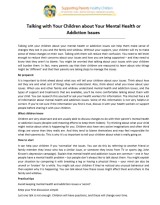If you're a frequent visitor to Healthify, why not share our site with a friend? Don't forget you can also browse Healthify without using your phone data.
Mental health – talking to others
Talking to adults and children about your mental health condition
Key points about talking to others about your mental health condition
- It's important to have a team supporting you when you have mental health needs.
- That team can include health professionals, whānau, friends or colleagues.
- Many people find it hard to talk to others about their mental health, but talking can reduce stress and help others understand what you’re going through.
- Talking to your children can help them understand what’s going on in your whānau and let them know there’s support for them.

Talking about your mental health can be a positive step towards recovery and well-being.
Mental health concerns can look differently in each of us. Regardless of whether you have a diagnosis (eg, anxiety, depression or psychosis) or not, it's useful to consider talking to your whānau about what you're experiencing.
If you're worried about being a burden or upsetting others, or you're nervous about what they’ll think, it can be helpful to know that these feelings are common. Reading this page is a good place to start.
You might decide to start by talking to your healthcare provider, Healthline (0800 611 116) or 1737 about your mental health issues. You could ask them for resources about your condition and how you can explain it to others. Or you could look at our mental health conditions page which has links to information about the different types of mental health conditions.
Letting others know how you feel is an important step in building a support network to help you on your journey. Knowing what is happening to you will give your whānau a chance to support you.
Below are some tips for talking to your whānau about your mental health condition.
You can choose who you want to tell. You may decide to tell different people some bits of information about what's happening, or you may prefer to have one person who you talk to about everything involving you mental health.
Some people won’t know a lot about mental illness and others will have more experience or knowledge. Some of your family and friends may be better at offering emotional support, be good at listening or have experienced mental health problems themselves. You may have a feeling about who’ll be understanding and who won’t at first. You may be surprised to find that people are more open and understanding than you expect.
It's your choice when to talk to others about your mental health. If you have any worries or concerns about telling them, you could discuss these with a professional or therapist.
If you're finding the idea of talking to relatives hard, you may want to bring them to an appointment with your healthcare provider. Either your healthcare provider could talk to them for you, or your healthcare provider could support you while you tell them.
To make sure there is enough time to discuss your situation, just mention mental health when making your appointment.
Things to think about before the conversation
- You might want to practise what you want to say beforehand. You could write down some phrases in preparation, such as “I haven’t been feeling myself lately” or “I’m finding it hard to cope at the moment.” You can find more phrases on the NAMI website(external link).
- You may prefer to choose a time when you’re feeling relatively well and able to talk. This might be earlier or later in the day.
- Choose a place where you feel comfortable, this may be a quiet place where you won’t be disturbed. Some people find meeting for a walk or drive can be a good opportunity for a chat.
- You might feel more comfortable having a conversation over the phone, or writing something down for them to read.
- You may decide to test out a conversation first by talking more generally about mental health. That could be talking about information you've read on this site about mental health.
- Decide if it would be useful to have information that helps explain how you’re feeling. This could be a pamphlet from your healthcare provider, or a link to a helpful video.
- Sharing how your life is being affected by your mental health will help others understand what you’re going through. For example you might mention that you're finding it hard to concentrate, or worrying about making mistakes.
- You might want to think ahead of time about whether there's a specific way they can support you. This might be emotional support, practical help with chores or childcare, going to appointments with you, or someone to talk to or give you a hug.
The conversation is likely to go better if you:
- prepare ahead who to tell and when to tell them
- start by testing out a small amount of information to check their reaction, and then
- give a clear way they could help.
Here's an example
“I heard something about how mental health problems will affect almost everyone at least once in their lifetime.” Pause to see response. “It made me think about how stressed I have been recently, I definitely feel anxiety, it stops me getting the kids to school on time because I feel worried about leaving the house and put it off. It would actually really help me if we could walk to school together.”
Remember that people react in different ways. Some people may feel powerless or uncertain about why you're telling them about your mental health. They may feel unsure about what you expect them to do. This can mean they seem angry or annoyed when really they're scared and wanting to help.
People may need time to process what you've said and sometimes it may be the wrong person or wrong time for them to give support. If their response isn't what you'd hoped for it can feel hard, but it's important to realise that they're telling you that this is something about them and not to feel that it's about you.
If it's been difficult to have this conversation then it can be useful to have planned something calming or comforting to do afterwards, you may want to arrange to have another person to spend time with.

Image credit: Canva
Talking to your children about your mental health can help them understand changes they might see in you and your family. It can also help them feel less confused or scared. This conversation will provide an opportunity for you to answer your child's questions. You may want to ask your healthcare provider or therapist for help preparing.
- Plan what you’re going to say. Keep your first discussion simple.
- Talk to your child using age-appropriate language.
- Think about how your condition affects you (eg, low motivation, tiredness, getting annoyed easily, being weepiness, or angry outbursts) and how your child might see these effects. This will help you understand what they might be experiencing. Ask if they've noticed any changes and explain why they're happening.
- Tell them enough to reassure them. Tell them you're getting support and taking steps to get better. Reassure them that you're managing your condition.
- Reassure them that they’re not to blame for your mood and behaviour and that it’s not their responsibility to make you better.
- Explain that many people experience mental health conditions.
- Let them know they can ask always ask questions, and suggest who else they can talk to if you're not feeling well.
- Ask them if they have any fears or worries and make plans to address them.
- Talk about having a plan for what to do if things get difficult or if there’s a crisis.
- Keep having small discussions so your child can build on their understanding. Their need for information will change as they grow.
Resources
The booklet How can I help my child? For parents who experience mental health issues(external link) has some great tips, including age-appropriate information. It can help you get started with planning how to have a conversation with your child.
You may want to watch these videos for children of parents with mental illness(external link) first, or with your child. They have been made by 2 older children who have parents experiencing mental health issues.
If you have a mental health condition, or are feeling stressed or burnt out at work, you may wonder if you should tell your boss. If it’s impacting on your ability to do your job, or your relationship with colleagues, it might be worth having a conversation about it. Consider the pros and cons first. You may be worried about stigma, however, being open about your condition will hopefully mean you’ll be treated fairly and with understanding, allowing you to reach your full potential at work.
Tips for having a discussion with your boss or manager
- Be aware of your legal rights beforehand. In Aotearoa New Zealand, the Human Rights Act 1993 and the Employment Relations Act 2000 (ERA) protect against discrimination in the workplace. Employers must accommodate employees with disabilities, including mental health conditions.
- Consider writing down what you want to say and practicing before, with a friend or family member or your therapist.
- Explain how your mental health problems are affecting your work.
- Suggest ways your employer can help, this might include:
- allowing time off to attend appointments
- being flexible
- having quiet workspaces you can use
- providing options for work remotely.
- Think about when will be a good time and place to have the discussion and who you want to be there.
- The relationship you have with your boss may influence the way you have the discussion. Your HR department may be able to support you or come up with a plan.
- It can be a relief to talk about your struggles and get the support you need. It also shows other employees that it’s okay to open up and get help if they’re struggling with similar issues.
Resource
You may find it useful to look at this online tool(external link) that can help you with considering the pros and cons in your situation and then deciding whether to tell people at your workplace about your mental health concerns.

Image credit: Canva
Disclosing to others(external link) NAMI, US
Brochures
Family talk – tips and information for families where a parent has a mental health problem or disorder(external link) COPMI, Australia, 2014
Helping children cope – a guide to help children understand mental illness(external link) Yellow Brick Road, NZ, 2020
Talking with your children about mental health and addiction issues(external link) Supporting Parents Healthy Children, NZ
How can I help my child?(external link) Supporting Parents Healthy Children, NZ
Parenting through challenging times(external link) Matua Raki, NZ
References
- Seeking help for a mental health problem – talking to friends and family(external link) Mind, UK, 2017
- Individuals with mental illness – disclosing to others(external link) NAMI National Alliance on Mental Illness, US
- How to talk about mental health – for people with mental health problems(external link) SAMHSA Substance Abuse and Mental Health Service Administration, US, 2023
- Talking with primary school age children about mental health issues(external link) Whāraurau Supporting Parents Healthy Children, NZ, 2017
- Talking with teenagers about parental mental health issues(external link) Whāraurau Supporting Parents Healthy Children, NZ, 2017
- How can I help my child? – for parents who experience mental health issues(external link) Whāraurau and Supporting Parents Healthy Children, NZ, 2017
- Rights and responsibilities in the workplace(external link) Mental Health Foundation of New Zealand, NZ
- Equal opportunity(external link) Employsure, NZ, 2025
- How to talk to your boss about your mental health(external link) Health Central, US, 2021
Brochures

Family talk – tips and information for families where a parent has a mental health problem or disorder
Australian Infant, Child, Adolescent and Family Mental Health Association Ltd, 2014

Talking with your children about your mental health or addiction issues
Supporting Parents Healthy Children, NZ
Credits: Healthify editorial team. Healthify is brought to you by Health Navigator Charitable Trust.
Reviewed by: Dr Sophie Ball, GP, Auckland
Last reviewed:






